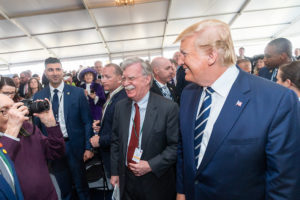
President Donald J. Trump joined by White House National Security Advisor Ambassador John Bolton participate in a meet and greet with active duty U.S. Service Members stationed in the United Kingdom Wednesday, June 5, 2019, at the Southsea Common in Portsmouth, England. (Official White House Photo by Shealah Craighead)
With the GOP poised for what looks like it could be a big win in the House today, and perhaps taking the Senate, all the factions of the party are eager to define its future in their own image. In Foreign Policy, Nadia Schadlow, a senior fellow at the Hudson Institute, attempts to define “Conservative U.S. Statecraft for the 21st Century.” Schadlow describes her “four principles driving conservative foreign policy”:
First, the belief in liberty lies at the core of conservative foreign policy because it offers a necessary skepticism about the encroaching nature of power and is a corrective to unrestrained and unaccountable government. At home, conservatives therefore prefer solutions that begin at the local level. In international politics, this translates into a bias toward national and regional solutions as opposed to global or supranational ones. It’s the principle of subsidiarity—a larger entity shouldn’t do what a smaller one can do just as well or better. A critical aspect of liberty is economic freedom; conservatives know that no country has prospered that has not moved toward greater economic freedom.
Second, a respect for national sovereignty is central to the preservation of liberty and maintenance of a stable international order. After World War II, the key institutions that formed the bedrock of the liberal international order all acknowledged that state sovereignty was inviolable and essential to peace and prosperity. The sovereign equality of nations is enshrined in the founding charter of the United Nations. Conservatives believe that individual states remain the best way of providing agency and order. Democracy without national sovereignty is impossible.
Third, an understanding that the international landscape is competitive—and will remain so—is fundamental for conservative realists. As the 2017 U.S. National Security Strategy noted, a “central continuity in history is the contest for power.” Many foreign-policy commentators—especially the liberal internationalists—recoil at this framing. “To many in the modern world, the word power has an unpleasant ring,” wrote the historian Donald Kagan. But the reality is that there are still competing political and economic systems and divergent views on how countries order the lives of their citizens.
Fourth, a strong U.S. military is necessary to prevail against these competing systems, defend U.S. interests, and project power. Not because the United States seeks to wage war, but because a strong military is necessary to preserving peace. Military power is also a necessary foundation for other forms of influence and statecraft.
These four principles—liberty, sovereignty, competition, and power—undergird the architecture of a conservative realist strategy. The overall goal of such a strategy is to preserve U.S. power so that Americans can safeguard their national economic and political interests, check those who seek instability and domination, and keep the peace.
Pay close attention to number four. Schadlow explains each point in greater detail further along in the piece, writing of the fourth (our emphasis added in bold):
Conservative military statecraft is based on a long and healthy tradition of supporting a strong military, which requires predictable defense budgets and the activities and capabilities required to maintain regional balances of power. This includes maintaining a forward presence abroad of sufficient scale and capability to deter conflict. These broad objectives do not mean that military power is a tool of first resort—rather, they represent an understanding that military power is a necessary foundation for keeping the peace and undergirding other forms of U.S. influence and statecraft.
Anyone who reads language about “maintaining a forward presence abroad” to deter conflict should immediately be skeptical. This is probably the antithesis of the America First foreign policy espoused by Donald Trump during his first campaign. You might think Schadlow would know this since she worked in the Trump administration as a deputy national security advisor, but John Bolton was his national security advisor, so apparently, Trump administration credentials are no immunization from neocon thinking.
If you’re willing to fight for Main Street America, click here to sign up for the Richardcyoung.com free weekly email.





